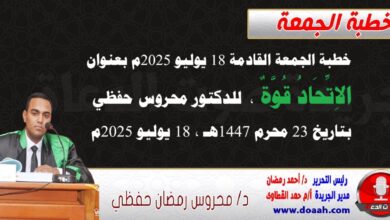The Merits of Prophet’s Companions

Sermon Plan
- Prophet’s Companions: High Position and Lofty Merits
- Their Merits in the Quran and Sunnah
- Love of Prophet’s Companions is a Sign of Belief
- Encouragement to Follow Their Examples
- Banning Insults and Impugnance of the Prophet’s Companions
- Examples of the Prophet’s Companions
Sermon Topic
Allah chose the best of people to the company of his prophet (may Allah’s Peace and Blessings be upon him); they sincerely believed in his message and upheld his cause proving most truthful in faith, deepest in understanding and best in good deeds. Those are the Prophet’s Companions, who fearlessly conveyed the divine message to all corners of the world and won the divine pleasure and good praise: “The first forerunners [in the faith] among the emigrants and the Helpers and those who followed them with good conduct, Allah is pleased with them and they are pleased with Him; He has prepared for them gardens beneath which rivers flow, wherein they will abide forever. That is the great attainment” (the Quran, 9: 100).
It was a generation decreed to make the difference and change life. They bore the torch of light to all humankind. It is beyond our abilities to realize their merits. However, it is sufficient to know that if we give a great deal in charity as huge as the mount of Uhud, it is even less than a handful or half of a handful of the Prophets’ Companions; the Prophet said, “Do not abuse my Companions, for by the One in Whose Hand is my soul, if any of you would have spent as much gold as Uhud Mount, it would not equal a Mudd or even half a Mudd of one of them” (al-Bukhari and Muslim).
They undertook the burdens of promoting the religion and paid the ultimate sacrifice in that cause to support Allah and His Prophet (may Allah’s Peace and Blessings be upon him): “Indeed, Allah has purchased from the believers their lives and their properties in exchange for that they will have Paradise. They fight in the cause of Allah, so they kill and are killed; it is a true promise He made in the Torah, the Gospel and the Quran. And who is truer to his covenant than Allah? So rejoice in your commitment which you have made. Such is the great success” (the Quean, 9: 111).
It is the Prophet’s right upon us to read his biography and follow his example and law. Likewise, we shall read the biographies and know the merits and virtues of the Prophet’s Companions to follow their ideal ethics and obedience to Allah. Their life is rich with useful lessons and reminders. Actually, Allah chose them as the best group to accompany his Prophet and promote his message. They are divienly decreed to be the best and most perfect of all Muslims. Unprecedenetd in piety and devotion, the human history never knew their like—as they are the first forerunners and the closest to Allah’s Pleasure (the Quran, 56: 10-14).
In celebration of their high status and merits, Allah honored their company of his Prophet in the Divine Word “Muhammad is the Messenger of Allah; and those with him are forceful against the disbelievers, merciful among themselves. You see them bowing and prostrating in prayers, seeking the grace and pleasure of Allah. Their mark is on their foreheads from the trace of prostration. That is their description in the Torah. And their description in the Gospel is as a plant which produces its offshoots and strengthens them so they grow firm and stand upon their stalks, delighting the farmers, so Allah may enrage by them the disbelievers. Allah has promised those who believe and do righteous deeds among them forgiveness and a great reward” (the Quran, 48: 29).
This verse dceclares them true believers, sincere servants and dedicated worshippers who are frequently bowing and prostrating in prayers. They only seek the grace from Allah and the worship left marks on their bodies. You can easily identify them by their fear and love of Allah. That is why they won the divine pleasure—the greatest of graces: “Surely, Allah was pleased with the believers when they pledged allegiance to you under the tree; He knew what was in their hearts, so He sent down tranquility upon them and rewarded them with an imminent conquest” (the Quran, 48: 18).
If we reflect on the Sunnah of the Beloved Prophet, we have several indications to their great excellence, high position and loftiness. The following are just examples of these prophetic statements:
- “The best of my people are those of my generation. Then those succeeding them, then those succeeding them, then people would come whose witness would precede their oath and their oath will precede their witness” (al-Bukhari and Muslim). Simply, they are the best in faith, advocacy and console of the Prophet (may Allah’s Peace and Blessings be upon him).
- Imam Ahmad narrated that Ibn Mas‘ūd (may Allah be pleased with him) said, “Allah looked into the hearts of His servants, and found that the heart of Muhammad is the purest of all, so He chose him for Himself and sent him with His message. Then He looked into the hearts of His servants, next to the heart of Muhammad, and He found that the hearts of his companions were the best of people’s hearts, so He made them supporters of His Prophet, who defended His religion. So whatever the Muslims think is good is divinely good and whatever they think is bad is divinely bad.”
- The Prophet (may Allah’s Peace and Blessings be upon him) described them as the source of Muslim security, as he said, “The stars are a source of security for the sky; when the stars disappear there comes to the sky what has been promised (of dooms). And I am a source of safety and security to my Companions and when I would go away there would befall my Companions) what they have been promised and my Companions are a source of security for my people and when they would go there would fall my people what they have been promised” (Muslim). The Companions were the source of relief from heresies; their blessings extended to bless two successive generations.
- Abu Sa‘īd al-Khudri narrated that the Prophet (may Allah’s Peace and Blessings be upon him) said, “Time will come when a group of people will wage a war and it will be said, ‘Do you have with you anyone who has accompanied Allah’s Messenger? They will say, ‘Yes’; and then victory will be given to them. Then a time will come when a group of people will wage a war and it will be said, ” Do you have with you anyone who has accompanied the companions of Allah’s Messenger?’ They will say, ‘Yes and then victory will be given to them. A time then comes when a group of people will wage a war, and it will be said, ” Do you have with you anyone who has been in the company of the companions of the companions of Allah’s Messenger?’ They will say, ‘Yes; and victory will be given to them” (al-Bukhari and Muslim).
- Allah also testifies to their benevolence, generosity and struggle in pursuit of Allah’s pleasure. Allah promised them eternal paradise: “But the Messenger and those who believed with him fought with their wealth and their lives. Those will have all that is good, and it is those who are the successful (88) Allah has prepared for them gardens beneath which rivers flow, wherein they will abide eternally. That is the great Success” (the Quran, 9: 88-89).
- ‘Umar (may Allah be pleased with him) said, “Once the Prophet commanded us to give in charity. Meanwhile, I had some property; I thought it was time to surpass Abu Bakr in a good deed. I brought half my property. The Messenger of Allah asked: What did you leave for your family? I replied: The same amount. Abu Bakr brought all that he had. The Messenger of Allah asked him: What did you leave for your family? He replied: I left Allah and His Prophet for them. I said: I shall never compete you in anything” (al-Tirmidhi).
- The love of the Prophet’s Companions is a sign of firm faith and true love of the Prophet (may Allah’s Peace and Blessings be upon him), as He said, “[I emphatically command you to fear] Allah regarding my Companions; do not make them objects of insults after me. Whoever loves them, it is out of love of me that he loves them. But whoever hates them, it is out of hatred for me that he hates them. Whoever harms them has harmed me and whoever harms me has offended Allah; whoever offends Allah shall soon be punished” (al-Tirmidhi and Ahmad from ‘Abdullah Ibn Mughaffal).
- The Prophet (may Allah’s Peace and Blessings be upon him) even made the lover of al-Ansaar a sign of faith and their hate a sign of hypocrisy: Al-Barā’ Ibn ‘Azib narrated that the Prophet (may Allah’s Peace and Blessings be upon him) said in respect of al-Ansaar: “None loves the Ansaar but a believer, and none hates them but a hypocrite. So Allah will love him who loves them, and He will hate him who hates them” (al-Bukhari and Muslim). Anas Ibn Malik also narrated that the Prophet (may Allah’s Peace and Blessings be upon him) said: “Love for the Ansaar is a sign of faith and hatred for the Ansaar is a sign of hypocrisy” (al-Bukhari).
For the Sharia, abusing the Prophet’s Companions is strictly forbidden; Abu Hurayrah (may Allah be pleased with him) narrated that the Prophet said: “Do not abuse my Companions! Do not abuse my Companions! By the One in Whose Hand is my soul, if any of you would have spent as much gold as Uhud Mount, it would not equal a Mudd or even half a Mudd of one of them” (Muslim).” ‘Abdullah Ibn ‘Umar further said, “Do not abuse the Companions of Muhammad; an hour of anyone of them is better than a forty-year worship of anyone of you” (Ahmad in Fadā’il al-Sahabah). We have to respect and honor them in recognition of their lofty position and merits.
The life of the Prophet’s Companions personified the grandness of faith and sincere love of Allah and His Prophet. It was a real translation of the high morals; they proved the best leaders in sacrifice and giving and the best masters of generosity, knowledge and good deeds. As such, the proved truthful: “For the poor emigrants who were expelled from their homes and their properties, seeking bounty from Allah and [His] approval and supporting Allah and His Messenger, [there is also a share]. Those are the truthful” (the Quran, 59: 8). Outstanding examples include the following:
- ‘Ali Ibn Abi Taleb (may Allah be pleased with him) spelt in the Prophet’s bed at the Night of Migration exposing his life to grave dangers while knowing that the polytheists besieging the house to kill him.
- Suhayb, the Roman, (may Allah be pleased with him) also sacrificed his wealth in support of the Religion and the Prophet (may Allah’s Peace and Blessings be upon him). When Suhayb t decided on migration to Medina, the disbelievers followed him. They insulted him claiming that he had come to Mecca as a worthless tramp, but their town was gracious enough and thanks to them he managed to make a good deal of wealth. They gave orders that he would not leave. Seeing this, he offered a compromise to give away all his wealth to them, so they let him depart peacefully; they eventually agreed to release him on condition of giving away his wealth for them. Arriving at Medina, the Prophet gave him good tidings, “The bargain proved lucrative, Abu Yahya! the bargain proved lucrative, Abu Yahya i.e. the nickname of Suhayb.” Allah I then revealed, “And there is the type of man who gives his life to earn the pleasure of Allah. And Allah is truly kind to His servants” (the Quran, 2: 207) (Ibn Hibban in his authentic collection).
- Abu Bakr (may Allah be pleased with him) gave the best moral example and noble ethics. Abu Hurayrah (may Allah be pleased with him) narrated that the Prophet (may Allah’s Peace and Blessings be upon him) said: “Who amongst you is fasting today? Abu Bakr said: I am. He again said: Who amongst you followed a funeral procession today? Abu Bakr said: I did. The Prophet again said: Who amongst you served food to the needy? Abu Bakr said: I did. The Prophet said: Who amongst you has today visited the sick? Abu Bakr said: I did. Thereupon, the Prophet said: Anyone in whom these good deeds are combined will certainly enter paradise” (Muslim).
- ‘Umar Ibn al-Khattab (may Allah be pleased with him) once went out at night when he passed by a woman and her children; she had a pot on the fire. The children were crying. ‘Umargreeted her with peace and she replied. He did not like to say: “O people of fire, so he called them: O people of light, may I come closer? he asked. ‘Come closer or leave us, she responded. ‘Umar drew closer and asked: ‘What is the matter? We are detained by the night and the cold,’ she replied. Why are the children crying? ‘Umar inquired. She said, “They are hungry.” What are you cooking,’ ‘Umar persisted in asking. There is only water boiling until the children fall Allah will judge between me and ‘Umar, the woman said, unaware of the one with she was speaking.
‘Umar immediately went to the state granary and put together the necessary provisions in a bag, and said, ‘Put it on my back, O Aslam.’ I objected and said, ‘I will carry it on your behalf.’ ‘Will you carry my burden for me on the Day of Resurrection?’ he wondered. I placed the load on his back, Aslam said, and he carried it to the woman. ‘Umar placed some flour into the pot and added some fat. He blew at the fire until smoke came out of his thick beard. He took off the pot from the fire when the food was ready. He said: ‘Let me have a plate.’ When the plate was brought, he dished the food and placed it in front of the children. ‘Eat,’ he said to them and the children ate until they are full. They kept praying for ‘Umar, unaware of his identity, saying that he is worthier of the emirate than ‘Umar! ‘Umar stayed with them until the children fell asleep. He gave them the remaining provision and then took leave of them saying: Say good when you visit the Commander of the Believers. On the way, he turned to me and said: ‘O Aslam, hunger kept them awake and made them cry; I loved to keep their company until I see in them what I just saw. I did not like to leave them unless I see them in comfort (Imam Ahmad Fada’il al-Sahabah).
Female Companions
Female Companions also have great situations of giving and support of Allah’s religion. The following situations are exemplary of their contributions:
- Khadijah (may Allah be pleased with her), the Mother of the Believers, had a great role in the promotion of Islam and defense of her husband i.e. the Prophet, for whom she paid the ultimate sacrifice and consoled him. She gave him a comforting message saying, “By Allah, Allah will never disgrace you, for by Allah, you keep good relations with your Kith and kin, speak the truth, help the poor and the destitute, entertain your guests generously and assist those who are stricken with calamities” (al-Bukhari).
- She was so loyal to the Prophet (may Allah’s Peace and Blessings be upon him) that he kept her praise after her death. ‘Aishah (may Allah be pleased with her) narrated that the Prophet well praised Khadijah (may Allah be pleased with her) whenever her name was mentioned. One day, I felt jealous and said. What makes you remember an old teethless woman of red gums, who died long ago while Allah replaced you with a better one? In reply, Allah has not replaced me with a better than she; she had faith in my message when people disbelieved, believed me when people belied and aided me with her wealth when people deprived me, and Allah gave her children from her to the exclusion of other women” (Ahmad).
- Nusaybah Bint Ka‘b al-Ansaariyyah (may Allah be pleased with her) also sets a good example to follow. The Prophet (may Allah’s Peace and Blessings be upon him) said, “During the battle of Uhud, I did not turn right or left but I had seen Um ‘Umarah fighting to defend me.” Someone came in determination to kill the Prophet but whenever he wanted to pierce the Prophet, she confronted him. He kept hitting her with the sword until her shoulder blade was badly damaged. The Prophet (may Allah’s Peace and Blessings be upon him) said, “What a grave pain you endure, Um ‘Umarah! In reply, she said: I can endure more and more and more, O Prophet. He responded, “Ask me for anything, Um ‘Umarah! She said, “I want to accompany you in Paradise.” The Prophet responded, “You are not alone but you and your family will be with me.” I do not care what may befall me in this world after that, she said. (Siyar A‘lam al-Nubalā’)
- If we really seek for progress, advancement, salvation and divine pleasure in this world and in the hereafter, we shall follow the brilliant examples of the Prophet’s Companions in life and ethics. The Prophet encourages us to follow in their footsteps saying, “I urge you to adhere to my Sunnah and the path of the Rightly-Guided Caliphs, and hold fats to that; beware of newly-invented matters, for every innovation is a way of misguidance” (Ibn Majah from al-‘Irbād Ibn Sariyah, may Allah be pleased with him).
We have to take lessons and clue children and women in the noble morals of the honorable Companions, and the way they followed the Prophet and sacrificed their lives and wealth in support of the religion.






